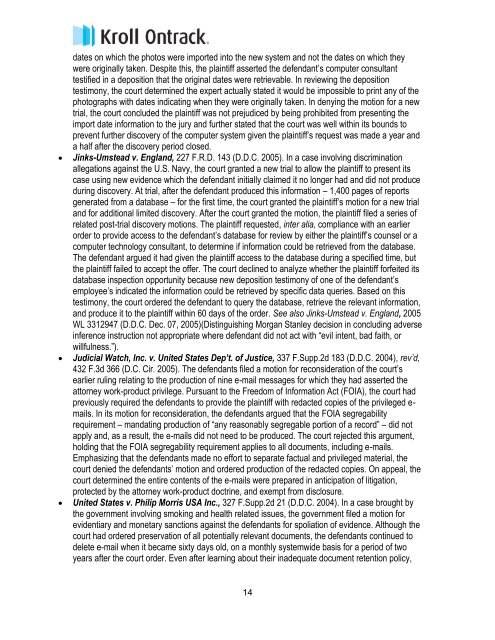Electronic Discovery and Computer Forensics Case List - Kroll Ontrack
Electronic Discovery and Computer Forensics Case List - Kroll Ontrack
Electronic Discovery and Computer Forensics Case List - Kroll Ontrack
Create successful ePaper yourself
Turn your PDF publications into a flip-book with our unique Google optimized e-Paper software.
dates on which the photos were imported into the new system <strong>and</strong> not the dates on which they<br />
were originally taken. Despite this, the plaintiff asserted the defendant’s computer consultant<br />
testified in a deposition that the original dates were retrievable. In reviewing the deposition<br />
testimony, the court determined the expert actually stated it would be impossible to print any of the<br />
photographs with dates indicating when they were originally taken. In denying the motion for a new<br />
trial, the court concluded the plaintiff was not prejudiced by being prohibited from presenting the<br />
import date information to the jury <strong>and</strong> further stated that the court was well within its bounds to<br />
prevent further discovery of the computer system given the plaintiff’s request was made a year <strong>and</strong><br />
a half after the discovery period closed.<br />
� Jinks-Umstead v. Engl<strong>and</strong>, 227 F.R.D. 143 (D.D.C. 2005). In a case involving discrimination<br />
allegations against the U.S. Navy, the court granted a new trial to allow the plaintiff to present its<br />
case using new evidence which the defendant initially claimed it no longer had <strong>and</strong> did not produce<br />
during discovery. At trial, after the defendant produced this information – 1,400 pages of reports<br />
generated from a database – for the first time, the court granted the plaintiff’s motion for a new trial<br />
<strong>and</strong> for additional limited discovery. After the court granted the motion, the plaintiff filed a series of<br />
related post-trial discovery motions. The plaintiff requested, inter alia, compliance with an earlier<br />
order to provide access to the defendant’s database for review by either the plaintiff’s counsel or a<br />
computer technology consultant, to determine if information could be retrieved from the database.<br />
The defendant argued it had given the plaintiff access to the database during a specified time, but<br />
the plaintiff failed to accept the offer. The court declined to analyze whether the plaintiff forfeited its<br />
database inspection opportunity because new deposition testimony of one of the defendant’s<br />
employee’s indicated the information could be retrieved by specific data queries. Based on this<br />
testimony, the court ordered the defendant to query the database, retrieve the relevant information,<br />
<strong>and</strong> produce it to the plaintiff within 60 days of the order. See also Jinks-Umstead v. Engl<strong>and</strong>, 2005<br />
WL 3312947 (D.D.C. Dec. 07, 2005)(Distinguishing Morgan Stanley decision in concluding adverse<br />
inference instruction not appropriate where defendant did not act with “evil intent, bad faith, or<br />
willfulness.”).<br />
� Judicial Watch, Inc. v. United States Dep’t. of Justice, 337 F.Supp.2d 183 (D.D.C. 2004), rev’d,<br />
432 F.3d 366 (D.C. Cir. 2005). The defendants filed a motion for reconsideration of the court’s<br />
earlier ruling relating to the production of nine e-mail messages for which they had asserted the<br />
attorney work-product privilege. Pursuant to the Freedom of Information Act (FOIA), the court had<br />
previously required the defendants to provide the plaintiff with redacted copies of the privileged emails.<br />
In its motion for reconsideration, the defendants argued that the FOIA segregability<br />
requirement – m<strong>and</strong>ating production of “any reasonably segregable portion of a record” – did not<br />
apply <strong>and</strong>, as a result, the e-mails did not need to be produced. The court rejected this argument,<br />
holding that the FOIA segregability requirement applies to all documents, including e-mails.<br />
Emphasizing that the defendants made no effort to separate factual <strong>and</strong> privileged material, the<br />
court denied the defendants’ motion <strong>and</strong> ordered production of the redacted copies. On appeal, the<br />
court determined the entire contents of the e-mails were prepared in anticipation of litigation,<br />
protected by the attorney work-product doctrine, <strong>and</strong> exempt from disclosure.<br />
� United States v. Philip Morris USA Inc., 327 F.Supp.2d 21 (D.D.C. 2004). In a case brought by<br />
the government involving smoking <strong>and</strong> health related issues, the government filed a motion for<br />
evidentiary <strong>and</strong> monetary sanctions against the defendants for spoliation of evidence. Although the<br />
court had ordered preservation of all potentially relevant documents, the defendants continued to<br />
delete e-mail when it became sixty days old, on a monthly systemwide basis for a period of two<br />
years after the court order. Even after learning about their inadequate document retention policy,<br />
14

















